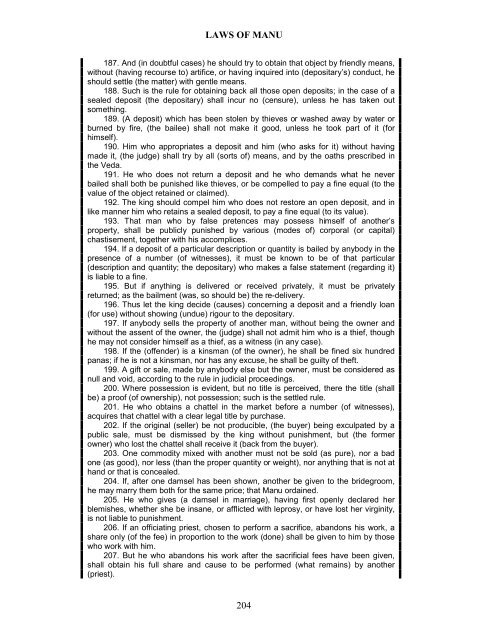Create successful ePaper yourself
Turn your PDF publications into a flip-book with our unique Google optimized e-Paper software.
LAWS OF MANU<br />
187. And (in doubtful cases) he should try to obtain that object by friendly means,<br />
without (having recourse to) artifice, or having inquired into (depositary’s) conduct, he<br />
should settle (the matter) with gentle means.<br />
188. Such is the rule for obtaining back all those open deposits; in the case of a<br />
sealed deposit (the depositary) shall incur no (censure), unless he has taken out<br />
something.<br />
189. (A deposit) which has been stolen by thieves or washed away by water or<br />
burned by fire, (the bailee) shall not make it good, unless he took part of it (for<br />
himself).<br />
190. Him who appropriates a deposit and him (who asks for it) without having<br />
made it, (the judge) shall try by all (sorts of) means, and by the oaths prescribed in<br />
the Veda.<br />
191. He who does not return a deposit and he who demands what he never<br />
bailed shall both be punished like thieves, or be compelled to pay a fine equal (to the<br />
value of the object retained or claimed).<br />
192. The king should compel him who does not restore an open deposit, and in<br />
like manner him who retains a sealed deposit, to pay a fine equal (to its value).<br />
193. That man who by false pretences may possess himself of another’s<br />
property, shall be publicly punished by various (modes of) corporal (or capital)<br />
chastisement, together with his accomplices.<br />
194. If a deposit of a particular description or quantity is bailed by anybody in the<br />
presence of a number (of witnesses), it must be known to be of that particular<br />
(description and quantity; the depositary) who makes a false statement (regarding it)<br />
is liable to a fine.<br />
195. But if anything is delivered or received privately, it must be privately<br />
returned; as the bailment (was, so should be) the re-delivery.<br />
196. Thus let the king decide (causes) concerning a deposit and a friendly loan<br />
(for use) without showing (undue) rigour to the depositary.<br />
197. If anybody sells the property of another man, without being the owner and<br />
without the assent of the owner, the (judge) shall not admit him who is a thief, though<br />
he may not consider himself as a thief, as a witness (in any case).<br />
198. If the (offender) is a kinsman (of the owner), he shall be fined six hundred<br />
panas; if he is not a kinsman, nor has any excuse, he shall be guilty of theft.<br />
199. A gift or sale, made by anybody else but the owner, must be considered as<br />
null and void, according to the rule in judicial proceedings.<br />
200. Where possession is evident, but no title is perceived, there the title (shall<br />
be) a proof (of ownership), not possession; such is the settled rule.<br />
201. He who obtains a chattel in the market before a number (of witnesses),<br />
acquires that chattel with a clear legal title by purchase.<br />
202. If the original (seller) be not producible, (the buyer) being exculpated by a<br />
public sale, must be dismissed by the king without punishment, but (the former<br />
owner) who lost the chattel shall receive it (back from the buyer).<br />
203. One commodity mixed with another must not be sold (as pure), nor a bad<br />
one (as good), nor less (than the proper quantity or weight), nor anything that is not at<br />
hand or that is concealed.<br />
204. If, after one damsel has been shown, another be given to the bridegroom,<br />
he may marry them both for the same price; that Manu ordained.<br />
205. He who gives (a damsel in marriage), having first openly declared her<br />
blemishes, whether she be insane, or afflicted with leprosy, or have lost her virginity,<br />
is not liable to punishment.<br />
206. If an officiating priest, chosen to perform a sacrifice, abandons his work, a<br />
share only (of the fee) in proportion to the work (done) shall be given to him by those<br />
who work with him.<br />
207. But he who abandons his work after the sacrificial fees have been given,<br />
shall obtain his full share and cause to be performed (what remains) by another<br />
(priest).<br />
204


















